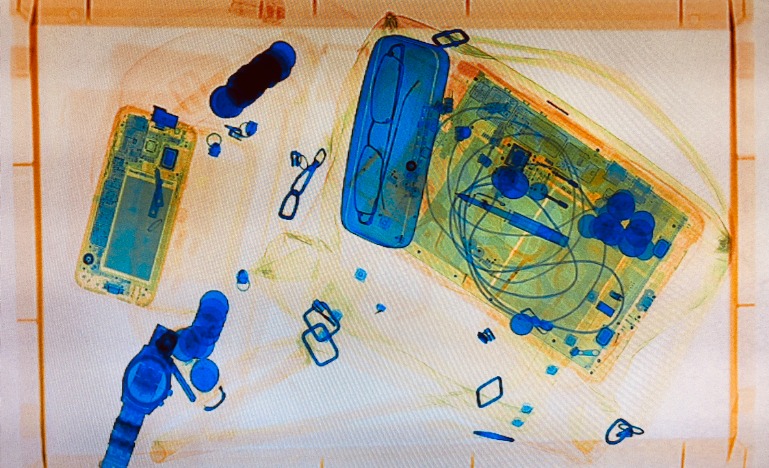Making up a new search standard
Critics are worried a new bill will make it too easy for Canadian border agents to justify searching electronic devices.

Two years ago, an Alberta court blew a big hole in the Canada Border Services Agency's policy on searching personal electronic devices at the border. Last month, the federal government tried to patch that hole.
Bill S-7, introduced in the Senate on March 31, proposes a new standard — "reasonable general concern" — for border officials to meet before combing through a traveller's smartphone or laptop.
The standard is a novel one — so novel that many of the experts who study the intersection of privacy rights and technology hadn't heard of it before now.
"The law has a very clear understanding of what 'reasonable suspicion' or 'reasonable grounds to believe' mean," says Lex Gill, lawyer and fellow at the Citizen Lab, Munk School of Global Affairs and Public Policy.
"This (reasonable general concern) standard, it's entirely new. To my knowledge, it has never existed before as a legal standard in this country."
In R v. Canfield, the Alberta Court of Appeal ruled that the definition of "goods" in the Customs Act is invalid to the extent it treats personal electronic devices — along with their troves of private information — just as it does luggage when it comes to searching travellers. The court concluded that border searches of such devices are unconstitutional because the law imposes no limits on them.
S-7 would introduce a limit (sort of) by imposing the new standard on searches of personal electronic devices. But the new standard is unclear, says Tamir Israel, a technology lawyer based at the University of Ottawa's Faculty of Law. He thinks that may have been the point.
"Before the (Canfield) decision, CBSA agents could basically do whatever they wanted with a traveller's electronic device," says Israel. "They had agency policies to guide them but no legal standard.
"This new standard is one that the CBSA can interpret any way it wants. I believe the department is trying to create new space to defend a broader range of searches."
Public Safety Minister Marco Mendicino defended the legislation in a media release, arguing it balances travellers' right to privacy with "ensuring that the CBSA can continue to fight serious crimes like child pornography and keep our borders secure."
Gill says the legislation looks more like a creature of expediency.
"My guess is that this legislation is based on deference to operational or safety concerns within the CBSA," she says. "More vigorous thresholds likely would create more work, would require more training, more time.
"We don't decide how human rights are protected on the basis of what's easiest for law enforcement. If the standard reads like some sort of gut feeling, how do you know it's been met?"
The loose standard means the risk of racial profiling at the border isn't going to fade anytime soon, says Gill. "Racialized people, particularly those who appear to be Arab or Muslim, are disproportionately affected by this."
"It's hard for me to imagine a standard lower than 'reasonable general concern,' unless it's no standard at all. It appears to be an attempt to rationalize or normalize profiling at the border."
It also means lawyers need to wake up to the risk of privileged information being inspected by border officials, says Israel.
"Lawyers, especially defence lawyers, have to take precautions to make sure that clients' sensitive and privileged information is protected," he says.
"I imagine some lawyers are aware of the risks, but not as many as should be."
In introducing the "reasonable general concern" standard in S-7, the federal government appears to be snubbing the work of the Commons Standing Committee on Access to Information, Privacy and Ethics. In its 2017 report on privacy rights and the border, the committee called on Ottawa to establish a standard of "reasonable grounds to suspect" for searches of personal electronic devices.
The Canada Border Services Agency wasn't wild about the idea. The decision in Canfield quoted at length Denis Vinette, a director-general at CBSA, arguing that a "reasonable suspicion" standard would tie the agency's hands.
"He described CBSA's policy of requiring 'articulable reasons' for examining electronic goods as falling 'well below' the legal threshold of individual reasonable suspicion," says the decision.
These are the sorts of questions the Supreme Court of Canada normally would be expected to sort out. But S-7 didn't take a normal path to Parliament. The SCC refused to grant leave to appeal R v. Canfield, leaving it to the federal government to respond with legislation.
"It's a weird way to get at a constitutional remedy," says Gill. "The SCC did have an opportunity to clarify but left it to the federal government to legislate. Now, we have legislation which doesn't seem to address the problem the Alberta court identified."
Israel says that by introducing S-7 in the Senate, the government may be trying to ease its path through Parliament with minimal scrutiny. A Commons committee might be reluctant to propose changes if it means dragging the bill through the entire process twice.
"The Commons committee is the usual route to make adjustments to legislation," Israel says. "The Senate, because it sees itself as the 'chamber of sober second thought,' tends to be more reluctant to make changes."


